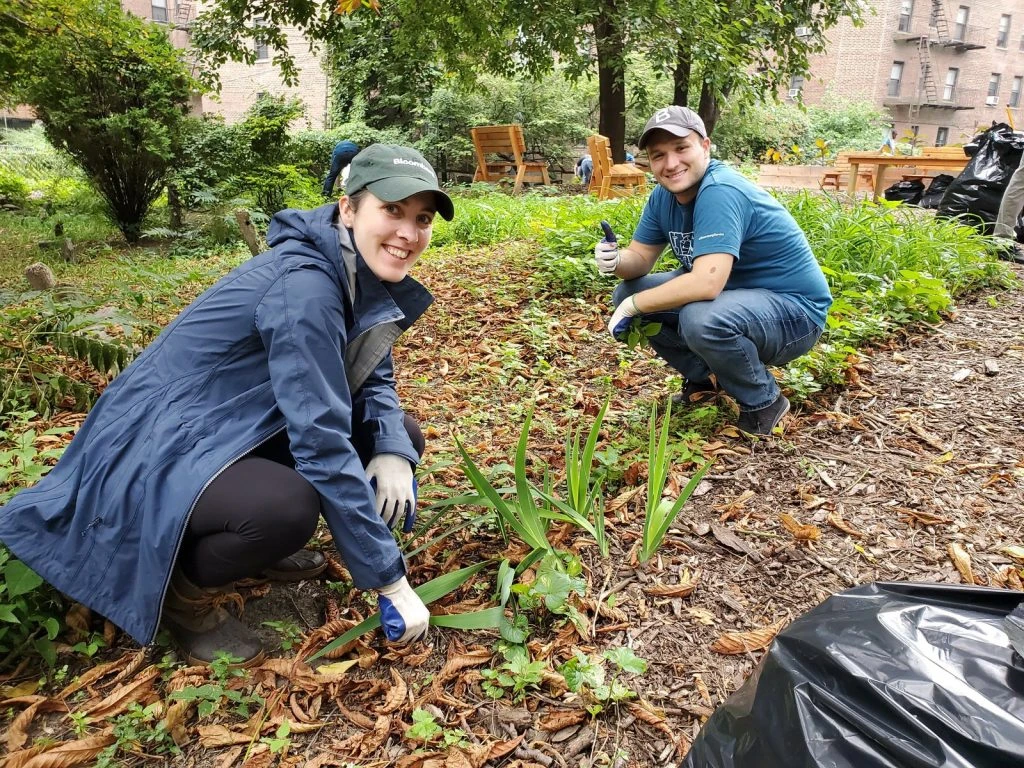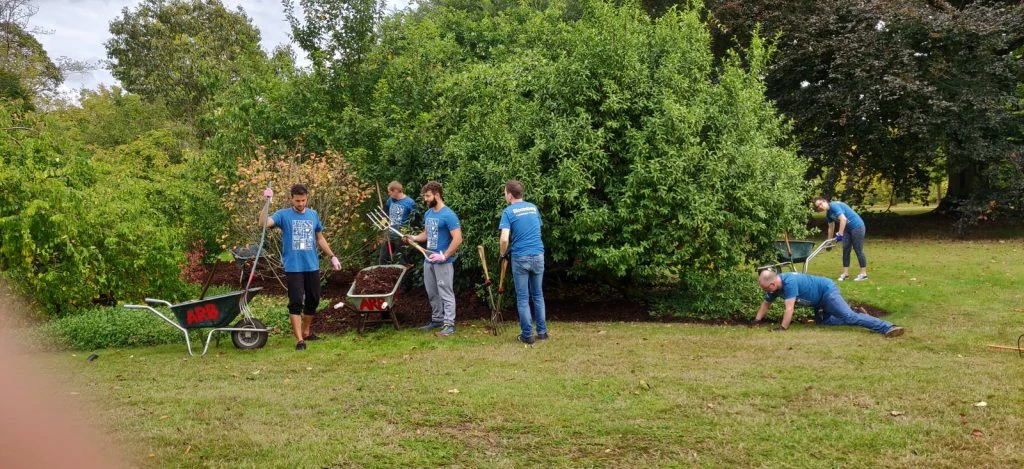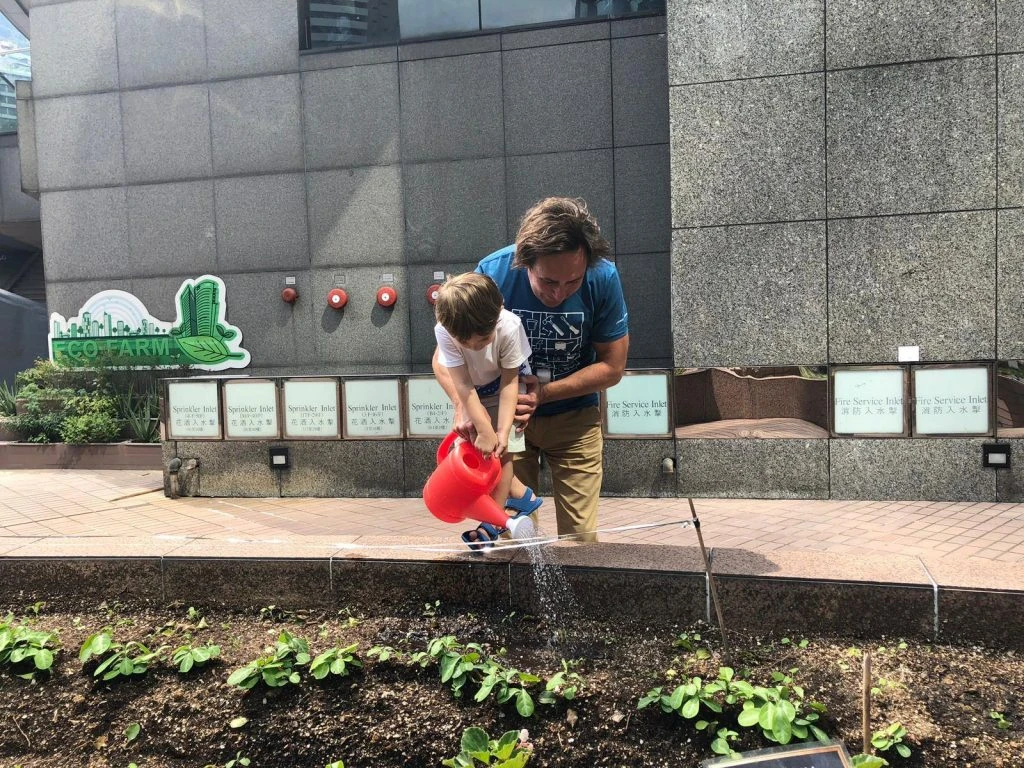Small actions can make a big difference on climate change
December 05, 2019
As world leaders meet in Madrid for the COP25 climate change conference, a new Bloomberg-commissioned public artwork is lighting up Bloomberg Arcade in London to inspire climate action.
The light and sound installation invites the public to reflect on animated scenes depicting the consequences of climate change beneath their feet, from deforestation and bee extinction, to coral bleaching and global warming.
Bloomberg supports a wide range of non-profit partners addressing some of the most serious threats to our environment. Here’s some advice from our partners on simple actions you can take to help protect our planet:

1. Plant a tree
In London, 2 million people are living in areas with illegal levels of air pollution and nine out of ten people around the world breathe polluted air, costing 7 million lives a year by World Health Organization estimates. According to data from our charity partner Trees for Cities, London trees remove 2.4 million tonnes of air pollution each year, including carbon dioxide and other gaseous toxins.
London’s approximately eight million trees provide at least £133 million of economic benefits a year by removing pollution, storing carbon and reducing surface water flooding. Every additional tree planted helps to further reduce the risk to public health and to the environment.
2. Switch to reusable cups and water bottles – say NO to single use plastics
Plastic packaging blights our streets, finds its way into oceans harming wildlife and takes centuries to break down whilst releasing toxic chemicals. Single use plastic bottles are the most prevalent form of plastic packaging in our oceans and accelerated action is needed to phase out non-recyclable plastic packaging
Global ocean conservation charity Oceana estimated 12 million tonnes of plastic enters the ocean every year and there are approximately 5 trillion plastic pieces weighing 250,000 tonnes in the ocean. Out of all plastic waste ever generated only 9% has been recycled.
Switching to reusable cups, bottles and shopping bags makes a big difference and significantly reduces the chance for more plastics to enter our oceans, green spaces and landfills.
3. Recycle at work as well as at home
Around 7 million tonnes of waste is produced each year from our homes, public buildings and businesses. Food waste and plastic packaging including single use coffee cups and plastic bottles combined account for around 30 per cent of this.
According to the Mayor of London’s Environment Strategy, it is estimated that over 40 million cups are thrown away each year in London, many of which are not recycled and are therefore sent to landfill or incineration. Office workers have a major role to play in helping to reduce this.
The Mayor of London is working to make London a zero waste city by 2026, where no biodegradable or recyclable waste will be sent to landfill. This goal can only be met when we all take action to dispose of waste properly and responsibly, no matter where we are located.
4. Avoid ocean-harming products and practices
There are many products and practices directly linked to harming endangered or threatened species, most notably unsustainable fishing methods and pollution.
Oceana recommends avoiding cosmetics that contain micro plastics, and jewelry made of coral or sea turtle shell. These products support unsustainable fishing and threaten important species and ecosystems.
Choose seafood that is healthy for you and the oceans from well-managed, wild fisheries. Download a guide from the Marine Conservation Society to help you make sustainable choices when you buy or order seafood.

5. Plant wild flowers and support our bees
Bloomberg’s charity partner Royal Botanical Gardens, Kew estimates that 97% of flower-rich meadows have been lost since the 1930s, meaning that bees, other pollinating insects as well as a variety of other species have lost their homes and source of food.
Almost 75% of crop plants require some degree of animal pollination, including many of our everyday fruit, vegetables and trees. Of all the different animals and insects that serve as pollinators, the most important are bees.
Urban gardens can play a major role in helping to support natural wildlife. Adding pollinator-friendly plants to your beds, window boxes and hanging baskets is a great way to begin. A flowering window box can provide enough pollen to support dozens of bees throughout the season.
6. Use natural products and methods for pest control
Biodiversity is a direct contributor to human life as we know it. Once a species of plant has gone, it can never be recovered. All the secrets it holds disappear with it. Royal Botanical Gardens, Kew has found one in five plant species are now at risk of extinction due to human impact.
Using natural products to keep your plants and gardens free from pests is an ecologically safe way to protect plants while also not harming biodiversity. One way to move away from pesticides and other chemicals is to encourage natural predators such as hedgehogs, birds and ladybirds into your garden.
Slugs and snails are very often the casualties of chemical products, but they can be just as easily deterred by adding eggshells around the bottom of your plants as they aren’t very keen on the sharp edges!
Learn more about protecting our native species by visiting Royal Botanical Gardens, Kew or one of the UK’s Royal Parks and gardens.
7). Walking to school on back roads instead of taking the car
A new study has revealed that London children travelling to primary schools across the capital are five times more exposed to air pollution than at any other time of the day.
Parents who drive to school contribute to high levels of air pollution on back streets as they tend to use these roads for school runs while leaving their car engines idling.
The Mayor of London recommends that walking, cycling and scooting on back streets are healthy alternatives that are good for the planet and good for you.
8. Kick the shopping habit
People are buying more clothes and keeping them for shorter periods, especially at this time of year. When polyester and nylon clothes are washed, they expel minuscule particles that contaminate sewage. These tiny fibres make up a significant part of the micro plastic polluting the world’s oceans.
Extending the active life of 50% of UK clothing by nine months would save: 8% carbon, 10% water, 4% waste per metric ton of clothing, according to WRAP’s Valuing Our Clothes report.
Changing our shopping habits will help to reduce the production of new clothing, so too will recycling and donating old garments. The UK’s 11,000 charity shops saved 330,000 metric tons of textiles from landfill, and helped to cut carbon emissions by millions of tons a year, through reusing and recycling second-hand clothes.
Find out where you can donate or recycle unwanted clothing by visiting your local authority’s website.
9. Help keep your communities clean
According to the Royal Parks, one in five visitors to London’s Royal Parks leave their litter behind on the ground, contributing to more than 3,000 tonnes of waste collected by park teams every year at a cost of more than £1.7m.
Not only does this hamper efforts to recycle effectively, it’s extremely dangerous for park life. Squirrels, hedgehogs, birds and aquatic life are all negatively impacted when litter enters their habitats and food chains.
The environment is everyone’s responsibility. Volunteering 30 minutes of your time to help collect litter in your local town, park or neighbourhoods can make a big difference. Not only does it help our wildlife, it also helps our communities.

10. Get involved
Volunteering is an exciting way to be able to work at the front line of protecting that environment, while also giving back to society.
Bloomberg is proud to support a wide range of charity partners in the UK and beyond that help our natural world. In 2018 alone, Bloomberg employees spent 17,370 hours volunteering on environmental stewardship issues in local communities around the world.
Contact your local environmental charity or community organisation to see how you too can get involved to help protect our environment.